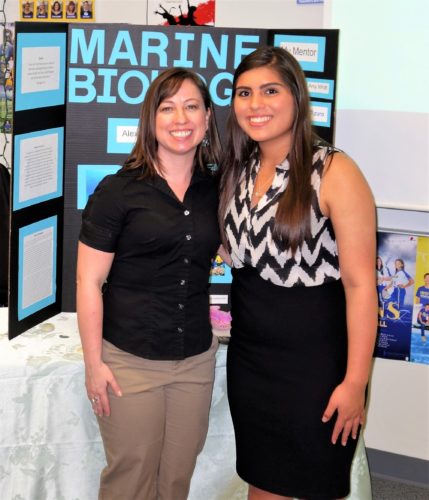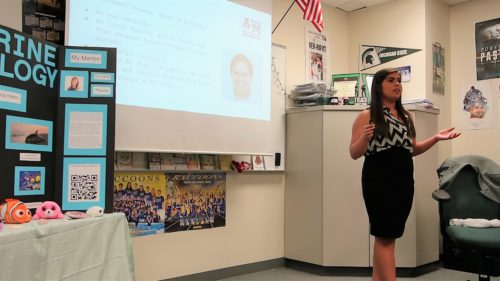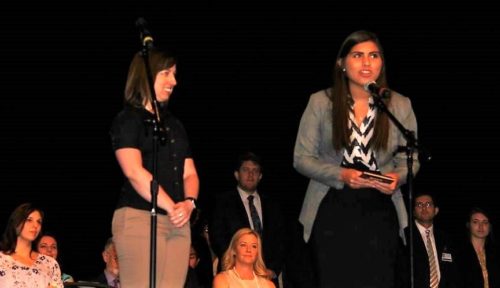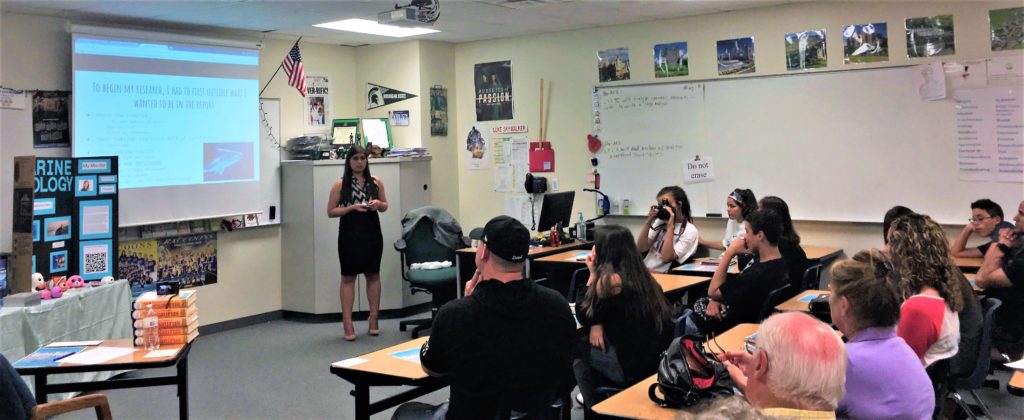 30…a classroom of students, a team of football players, and the number of vaquita left on Earth. These tiny, critically endangered porpoises live only in the northern Gulf of California in Baja California, Mexico, and their population is actually estimated to now be less than 30. Ironically, the number of family and friends that recently attended Alexandria Hahn’s presentation on the peril of the vaquita was close to the same size as the current vaquita population.
30…a classroom of students, a team of football players, and the number of vaquita left on Earth. These tiny, critically endangered porpoises live only in the northern Gulf of California in Baja California, Mexico, and their population is actually estimated to now be less than 30. Ironically, the number of family and friends that recently attended Alexandria Hahn’s presentation on the peril of the vaquita was close to the same size as the current vaquita population.
Alexandria’s presentation on 17 May 2017 was her final requirement for completing Frisco’s Independent Study and Mentorship (ISM) program, a challenging course for which junior and high school students must apply, interview, and be recommended. During this rigorous course offered at Frisco Independent School District high schools in Texas, students research careers and specific topics related to their chosen career fields, work with mentors to gain real world experience and insight, and create a final product related to their topic of study. This program helps the students learn more about their chosen profession and how to pursue their desired career path.
During this school year, Alexandria has been consulting with her mentor Amy Whitt (Azura’s CEO) on how to pursue a career in marine mammal conservation and management and how to effectively research her topic of study which is the vaquita. Through her initial research on human impacts to marine mammal species, Alexandria learned about the disastrous impacts that fishing gear has had on two endangered marine mammal species, the North Atlantic right whale and the vaquita. She then decided to focus her research on the vaquita, the world’s most endangered marine mammal species, and make her final product a report on the ecology and conservation management of the vaquita.
To compile extensive information and data on the vaquita and conservation efforts to save this species, Alexandria scoured library databases for pertinent scientific literature and also interviewed two National Oceanic and Atmospheric Administration (NOAA) scientists who are two of the world’s leading experts on the vaquita. Dr. Thomas Jefferson helped found ¡VIVA Vaquita!, a coalition of scientists, educators, and conservationists who strive to generate awareness of the vaquita and to promote a healthy Upper Gulf of California ecosystem. Dr. Gerrodette has worked with the vaquita for 25 years and has been the lead statistician calculating and detecting changes in vaquita abundance since the first systematic survey for vaquitas was conducted in 1997.
During her research project, Alexandria learned that entanglement in gillnets is the single greatest cause of decline of the vaquita porpoise. The vaquita share their home range with the totoaba, one of the largest drum fish on Earth. The totoaba’s swim bladder is considered a delicacy in some Asian cultures, mostly China and Hong Kong, where the bladders are sold for $10,000 per kilogram. Like the vaquita, the totoaba are quite rare and in need of protection. Although the Mexican government outlawed totoaba fishing in the 1970s, the increased demand and value for their swim bladders is too much for local fishermen and criminals to resist. Unfortunately, the vaquita are accidentally caught in the gillnets set for the totoaba and drown.
Although millions of dollars have been spent to conserve the vaquita, the illegal fishing activities have proven to be too much for this periled population. As a last-ditch effort to save the species, the International Committee for the Recovery of the Vaquita is planning to capture as many vaquitas as they can and relocate them to a protected sea pen in hopes that they can mate and reproduce and then eventually be returned to the wild.
 Alexandria eloquently presented this story of the vaquita to her peers, friends, and family while other ISM students presented topics related to other career fields from sport finance and trauma surgery to aerospace engineering. Prior to the individual student presentations, all 66 ISM students recognized their mentors who included a wide variety of professionals ranging from doctors and lawyers to police officers and scientists. Each mentor received a plaque thanking them for their volunteer service and for helping “lead the way” for these students.
Alexandria eloquently presented this story of the vaquita to her peers, friends, and family while other ISM students presented topics related to other career fields from sport finance and trauma surgery to aerospace engineering. Prior to the individual student presentations, all 66 ISM students recognized their mentors who included a wide variety of professionals ranging from doctors and lawyers to police officers and scientists. Each mentor received a plaque thanking them for their volunteer service and for helping “lead the way” for these students.

Continue to follow Alexandria’s journey to becoming a marine biologist here.


